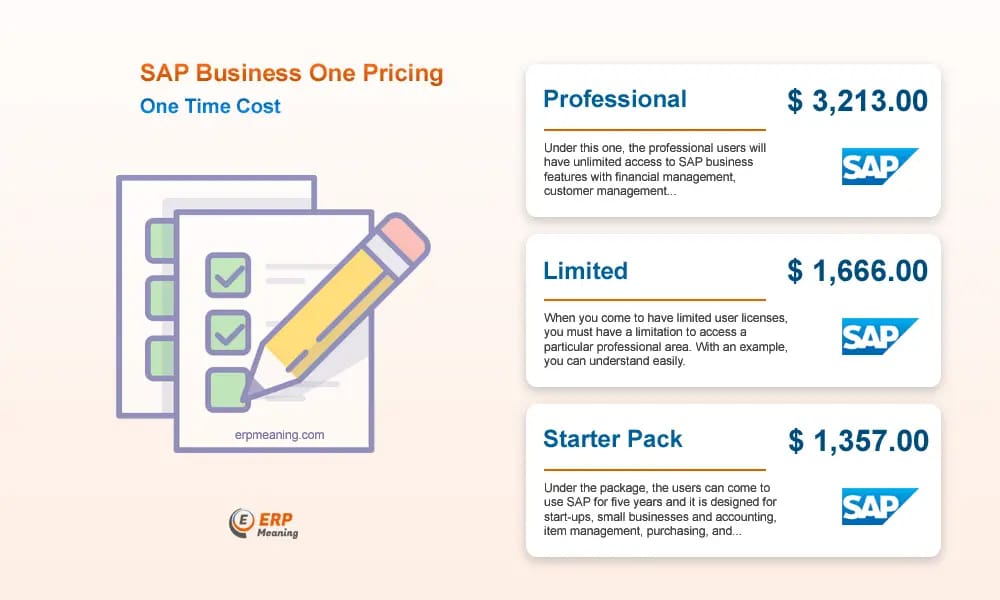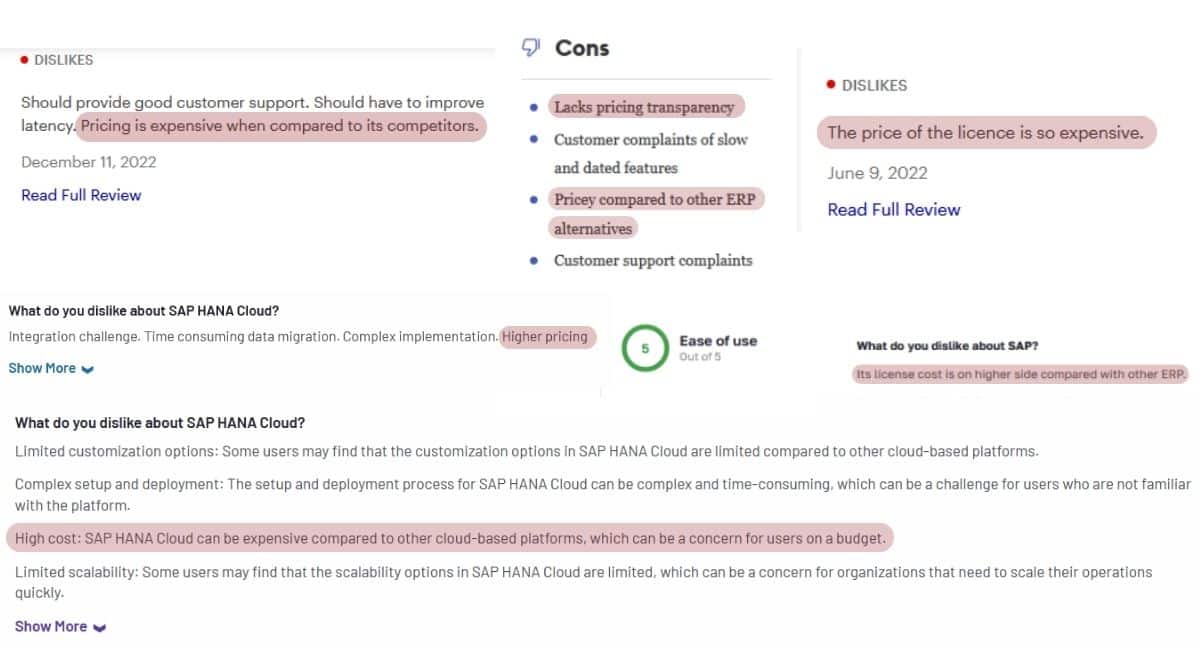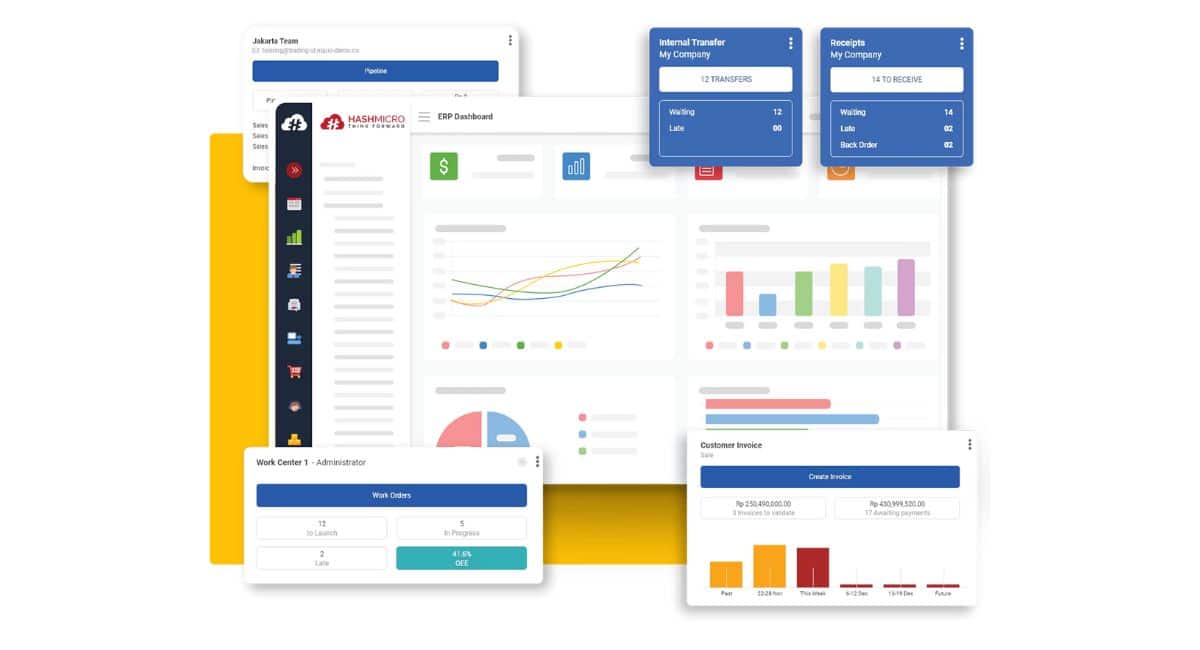Table of Content:
Table of Content
Why SAP ERP Is Expensive
The cost of implementing and maintaining SAP ERP can be a major challenge for many businesses, especially small and medium-sized enterprises. There are several reasons why SAP software has an exorbitant price among its competitors. Below are three main reasons why this software is expensive.
- Complexity and functionality
The SAP ERP software itself is free. However, the complicated implementation along with customization makes it costly. The implementation involves adjusting business processes and integrating the system. This can be difficult and may require consultants. As a result, there is an additional cost.
- Development and maintenance
The initial costs of developing and implementing SAP ERP software, while the software itself is offered without charge, constitute a substantial part of the overall expenses. Customization tailored to fit specific business processes involves a significant investment, including hiring consultants and integrating the system.
These development expenses substantially contribute to the overall cost of adopting SAP.
Moreover, ongoing maintenance and support services further elevate the expenses. SAP’s foreign origins might lead to limited local support infrastructure, resulting in additional costs for after-hours support, language barriers, and the potential need to engage third-party support providers or increase in-house support staff.
- Brand recognition
SAP’s strong reputation as a market leader significantly impacts its pricing structure. The brand’s prominence and recognition as a leader in enterprise software solutions often correlate with premium pricing.
The perceived value attached to SAP’s market leadership influences its pricing strategy, contributing to the relatively higher cost of SAP ERP compared to other available SAP alternatives. Here is an illustration of SAP ERP pricing:

HashMicro ERP as One of the Affordable Alternatives to SAP ERP
Are you looking for a more cost-friendly ERP solution that matches SAP’s quality?
If your company is in a growth phase and exploring ERP solutions without the hefty SAP price tag, HashMicro might be your best choice, especially in Singapore.
HashMicro ERP offers a streamlined and automated system meticulously crafted to streamline and integrate essential business operations. It serves as a centralized platform, effectively enhancing efficiency and productivity for businesses and companies.
When considering the advantages of HashMicro over SAP, HashMicro’s distinct advantages emerge as a compelling solution tailored to meet the specific needs and budget constraints of businesses and organizations in Singapore:
1. Tailored functionality for various business needs
HashMicro ERP provides adaptable features and customizable modules to suit specific business needs across 15+ industries, like manufacturing, F&B, schools, engineering, and many more. Its robust technical capabilities empower businesses with tailored solutions, ensuring precise alignment with varying industry requirements.
You can apply for a free demo of HashMicro ERP here!
2. More affordable pricing model
With its modular approach, HashMicro ERP enables businesses to opt for essential modules, significantly lowering the overall cost.
Moreover, with a dedicated Singaporean team and available grants from the Singapore government for financial support like the NTUC CTC grants of up to 70% and the EDG of up to 50%.
HashMicro also offers ERP at various price points to meet various preferences, both for manufacturing vs mining companies as well as for SaaS or cloud vs on premise ERP system needs.
Most importantly, the probability of getting your grant application approved will be high as HashMicro is a highly approved partner for the Singapore government grants.
You can see HashMicro ERP’s pricing scheme added to the grants further in the image below.
3. Unlimited user option
Your company’s scalability can be constrained when you’re using an ERP system with a limited user number. Upgrading the system so that you can add the number of users would cost more.
However, HashMicro ERP offers an unlimited user option, allowing businesses to expand their user base without additional charges, ensuring seamless scalability and accommodating growth without financial concerns.
4. Responsive customer support
HashMicro’s ERP system localized customer support is headquartered in Singapore. This ensures prompt and high-quality assistance tailored to businesses within the region.
With more than 1750 clients, you can explore real-world instances of businesses effectively utilizing HashMicro ERP. For example, these companies in Singapore and also other countries have seamlessly integrated HashMicro into their operations, achieving enhanced efficiency and streamlined processes:
- Forbes Asia
- Bee Choo
- Bank of China
- Singapore’s Ministry of Education
- Wendy’s
- Marimas
- Decorient
- and many more
Also Read: Most Important Modules of ERP and Their Benefits!
Considerations in Choosing ERP Software
- Identifying your business needs
Understanding your business’s unique requirements is fundamental when selecting Enterprise Resource Planning (ERP) software. This phase involves a comprehensive analysis of your operational necessities, ensuring alignment between the software functionalities and your business objectives.
- Evaluating budget constraints
Careful evaluation of your budgetary constraints is crucial in the selection process. Assessing the costs involved in implementing and maintaining ERP software helps in determining a solution that optimizes functionality while staying within budgetary limits.
- Comparing features and pricing
Comparing various ERP solutions’ features and pricing models allows for an informed decision-making process. By comparing the functionalities against costs, businesses can ascertain the best-suited ERP system that aligns with their specific needs and financial capacities.
Read Also: Top ERP Software Recommendations – Explore the best software options available this year and find the right fit for your business needs.






































